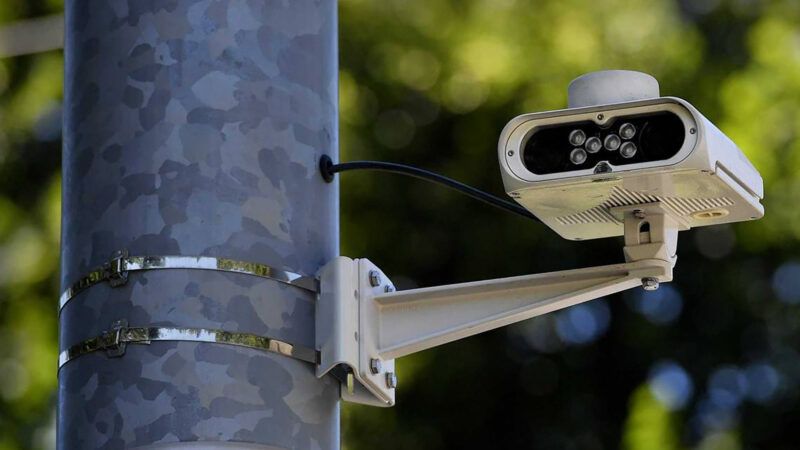Sacramento Cops Shared License Plate Data With Anti-Abortion States
And a grand jury says that's illegal.

"Sacramento County drivers are likely unaware that, as they travel on county streets and highways, their vehicles are being tracked by an intricate network of stationary and mobile cameras."
That was the conclusion of a report released last week by the Sacramento County Grand Jury, a 19-member panel billed as "the independent watchdog over public entities" within the California county.
Worse yet, Sacramento authorities are not only collecting drivers' information but sharing it with law enforcement agencies in other states—including states that criminalize abortion—all without a warrant.
The California Highway Patrol operates automated license plate recognition systems (ALPRs), cameras that "automatically capture an image of a vehicle and the vehicle's license plate, transform the plate image into alphanumeric characters using optical character recognition, compare the plate number acquired to one or more databases (also known as 'hot lists') of vehicles of interest to law enforcement, and then alert law enforcement officers when a vehicle of interest has been observed."
In 2015, California passed Senate Bill 34, which established rules by which other law enforcement agencies (LEAs) in the state could access ALPR data. For example, the law established that "a public agency shall not sell, share, or transfer ALPR information, except to another public agency, and only as otherwise permitted by law." It defined public agency as "the state, any city, county, or city and county, or any agency or political subdivision of the state or a city, county, or city and county, including, but not limited to, a law enforcement agency."
In other words, LEAs within the state of California could only share ALPR data with other California-based agencies, not out-of-state departments or the federal government.
"The Sacramento County Grand Jury found the Sacramento Sheriff's Office (SSO) had previously been cited by a state audit to be non-compliant with the state's prohibition on sharing data with out-of-state entities," the grand jury's report found. As a result, jurors opened an investigation into the office's use of ALPR information.
The jurors note the system's staggering capabilities: "ALPR technology does not only capture moving vehicles, but parked cars can also be scanned. Over time, LEAs can piece together details about where individuals live, work, worship, shop, and participate in other daily activities. Some mobile ALPR cameras can capture up to 1,800 plates per minute. The SSO reportedly scanned 1.7 million plates in one week," images it then stores "for two years from the date of capture."
The report also notes the potential civil liberties violations that could come from such a high-tech setup: "The system cannot distinguish between cars used in criminal activities and those operated legally," and multiple newspaper reports have found that "the SSO and the Sacramento Police Department (SPD) were sharing ALPR data with anti-abortion states and unauthorized entities." In 2022, California passed Assembly Bill 1242, which "would prohibit a state or local law enforcement agency or officer from knowingly arresting or knowingly participating in the arrest of any person for performing, supporting, or aiding in the performance of an abortion or for obtaining an abortion."
Ultimately, the grand jury found that by sharing ALPR information with law enforcement agencies in other states, the SSO and SPD "violated SB 34 and unreasonably risked the aiding of potential prosecution by the home-state of women who traveled to California to seek or receive healthcare services."
This was also not new information: According to the report, a state auditor found in 2020 that "the SSO shared its ALPR images with more than 1,000 entities within California and across the United States" but found "no evidence that the SSO consistently determined whether these entities had a right and need to access the images or if they were public agencies."
In a May 2023 letter to 71 police agencies in the state, three civil liberties groups—the Electronic Frontier Foundation (EFF) and two California chapters of the American Civil Liberties Union—asked that officials "immediately stop sharing automated license plate reader (ALPR) data with law enforcement agencies in other states because it violates California law and could enable prosecution of abortion seekers and providers elsewhere."
The EFF alleged that agencies receiving the letter "have shared ALPR data with law enforcement agencies across the country, including agencies in states with abortion restrictions including Alabama, Idaho, Mississippi, Oklahoma, Tennessee, and Texas."
In posts from its official account on X (formerly Twitter), the Sacramento County Sheriff's Office claimed at the time that the groups behind the letter "have lied that law enforcement sharing this information is an attempt to violate people's legal rights," adding, "These false claims are intentional and part of a broader agenda to promote lawlessness and prevent criminals from being held accountable."
"That agency, at least, seems to have had a change of heart," notes EFF's Hudson Hongo, as grand jury foreperson Steve Caruso said that "after meeting with the Sheriff's Office in the course of our investigation, they decided to stop sharing ALPR data with out-of-state LEAs."
Unfortunately, that doesn't put an end to it, as the grand jury's press release noted that "the Sacramento Police Department continues to share ALPR data with Washington, Oregon, Nevada, and Arizona LEAs."


Show Comments (58)